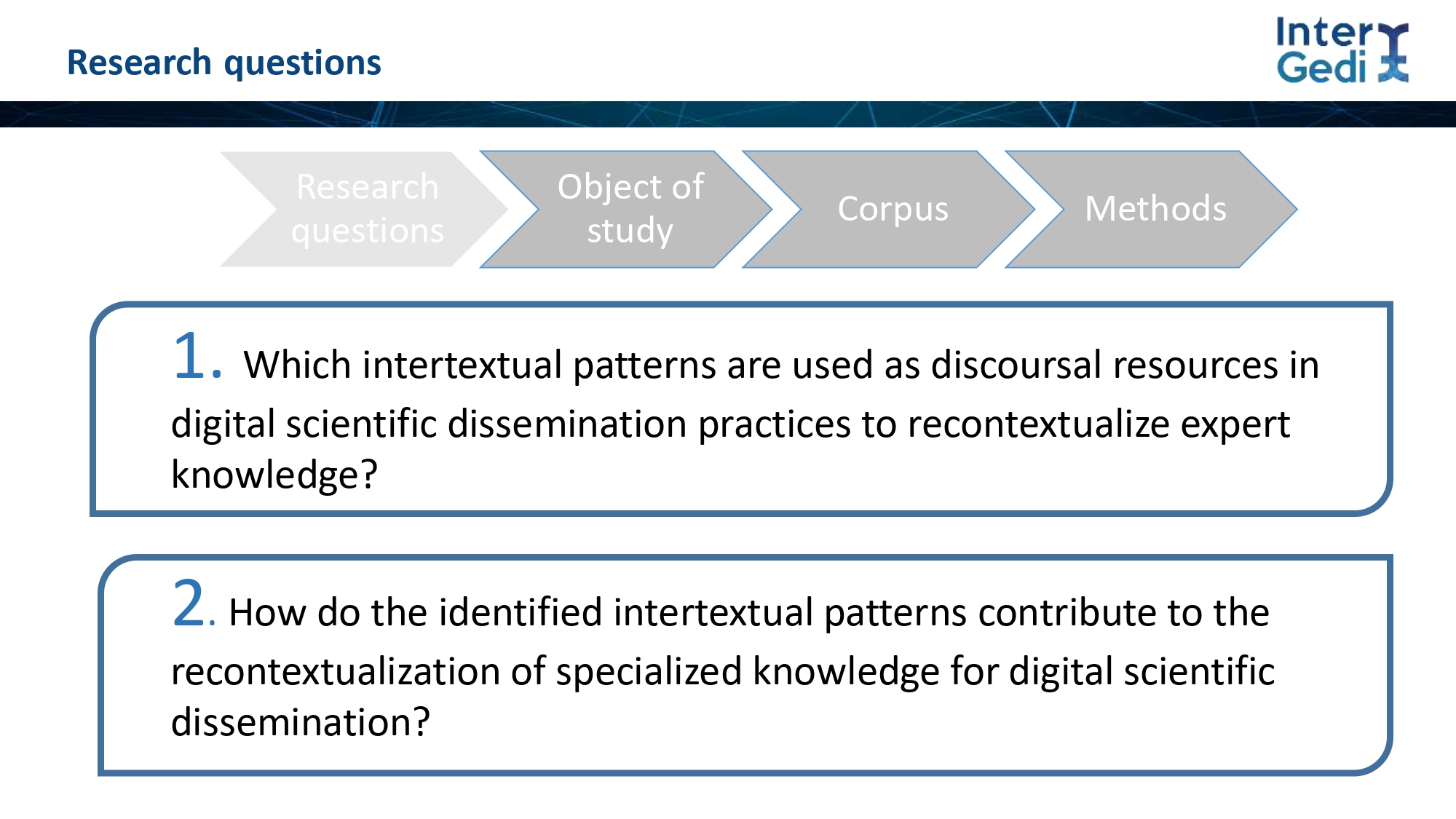CMC 2023: Rosa Lorés explores intertextual patterns in science dissemination

Rosa Lorés Sanz participated in CMC-Corpora 2023 (10th International Conference on CMC and Social Media Corpora for the Humanities), which was held 14th-15th September 2023 by the University of Mannheim (Germany) and the Leibniz Institute for the German Language (IDS).
In her talk, titled “The recontextualization of expert knowledge: intertextual patterns in digital science dissemination”, Dr. Lorés addressed the issue of intertextuality in digital scientific feature articles. For this, she presented her findings as regards the use of (direct and indirect) quotations, within which she identified three subcategories based on the intertextual resources and affordances exploited: textual quotations, multimodal quotations and digital quotations.
The full abstract of Rosa Lorés Sanz’s talk can be consulted as follows:
The recontextualization of expert knowledge: intertextual patterns in digital science dissemination
Technology is having an unprecedented impact on the communication of specialized knowledge, which takes advantage of the use of digital modes and media to reach multiple, diversified audiences. To serve this purpose, expert knowledge is subjected to various processes of recontextualization. I here explore the intertextual patterns used in digital scientific dissemination to recontextualize expert knowledge to reach less specialized audiences, as well as the role played by digital affordances to shape the intertextual patterns identified. For such purposes, I focus on a corpus of 30 digital scientific feature articles, where, among other features, the use of direct/indirect quotations and intertextual text-types and networks are explored. Results reveal the existence of patterns of intertextuality in the feature articles analysed, in which digital affordances (i.e. hyperlinks) combine with other “offline” intertextual resources for different recontextualization purposes and in various ways, depending on the level of expertise and specialisation aimed at in the text.
References
Adami, E. (2014). Retwitting, reposting, repinning; reshaping identities online: Towards a social semiotic multimodal analysis of digital remediation. LEA – Lingue e Letterature d’Oriente e d’Occidente, 3(3), 223–243.
Bazerman, C. (2004). Intertextuality : How texts rely on other texts. In C. Bazerman, & P. Prior (Eds.), What Writing Does and How it Does it: An Introduction to Analyzing Texts and Textual Practices. New Jersey, USA: Lawrence Erlbaum Associates, pp. 83-96.
Bernstein, B. (1996). Pedagogy, Symbolic Control and Identity. Theory, Research, Critique. London, UK: Taylor and Francis.
Blommaert, J. (2005). Discourse: A Critical Introduction. Cambride: Cambridge University Press.
Bondi, M., Cacchiani, S., Mazzi, D. (2015). Discourse in and through the Media: Recontextualizing and Reconceptualizing Expert Discourse. Newastle upon Thyne, UK: Cambridge Scholars Publishing.
Calsamiglia, H., Van Dijk, T. (2004). Popularization discourse and knowledge about the genome. Discourse & Society, 15(4), pp. 369–389. https://doi.org/10.1177/0957926504043705
Engberg, J. (2021). Prologue. In G. Pontrandolfo, & S. Piccioni (Eds.), Comunicación especializada y divulgación en la red. Aproximaciones basadas en corpus. London, UK: Routledge, pp. Vii–x. Fairclough, N. (1992). Discourse and Social Change. Cambridge, UK: Polity Press.
Farrelli, M. (2020). Rethinking intertextuality in CDA. Critical Discourse Studies, 17(4), pp. 359–376. https://doi.org/10.1080/17405904.2019.1609538
Giménez, J., Baldwin, M., Breen, P., Green, J., Roque Gutiérrez, E., Paterson, R., Pearson, J., Percy, M., Specht, D., Waddell, G. (2020). Reproduced, reinterpreted, lost: Trajectories of scientific knowledge across contexts. Text&Talk 40(3), pp. 293–324.https://doi.org/10.1515/text-2020-2059
Hyland, K. (1996). Writing without conviction? Hedging in science research articles. Applied Linguistics 17(4), pp. 433–454. https://doi.org/10.1093/applin/17.4.433
Johansson, M. (2019). Digital and written quotations in a news text: The hybrid genre of political opinion review. In P. Bou-Franch, & P. Garcés-Conejos Blitvich (Eds.), Analyzing Digital Discourse. New Insights and Future Directions. Switzerland: Springer, pp. 133–162.
Kristeva, J. (1986). Word, dialogue and novel. In Moi, T. (Ed). The Kristeva Reader. London, UK: Blackwell, pp. 35–61.
Li, Y. (2015). ‘Standing on the shoulders of giants’: Recontextualization in writing from sources. Science and Engineering Ethics 21, pp. 1297–1314. https://doi.org/10.1007/s11948-014-9590-4
Linell, P. (1998). Discourse across boundaries: On recontextualizations and the blending of voices in professional discourse. Text 24(3), pp. 143–157. https://doi.org/10.1515/text.1.1998.18.2.143
Luzón, M.J. (2013). Public communication of science in blogs: Recontextualizing scientific discourse for a diversified audience. Written Communication 30(4), 428–457. https://doi.org/10.1177/0741088313493610
Luzón, M.J. (2023). Forms and functions of intertextuality in academic tweets composed by research groups. Journal of English for Academic Purposes 64, 101254
Myers, G. (2003). Discourse Studies of scientific popularization: questioning the boundaries. Discourse Studies 5(2), pp. 265–279. https://doi.org/10.1177/1461445603005002006
Puschmann, C. (2015). A digital mob in the ivory tower? Context collapse in scholarly communication online. In M. Bondi, S. Cacchiani, & D. Mazzi (Eds.), Discourse in and through the Media: Recontextualizing and Reconceptualizing Expert Discourse. Cambridge Scholars Publishing. Newastle upon Thyne, UK: Cambridge Scholars Publishing, pp. 22–45.
Sancho-Ortiz, A. (under review). Analysing social media in EFL teaching and learning: Twitter for science dissemination. Profile: Issues in Teachers’ Professional Development, 25(2).Zappavigna, M. (2022). Social media quotation practices and ambient affiliation: Weaponising ironic quotation for humorous ridicule in political discourse. Journal of Pragmatics, 191, 98–112.
